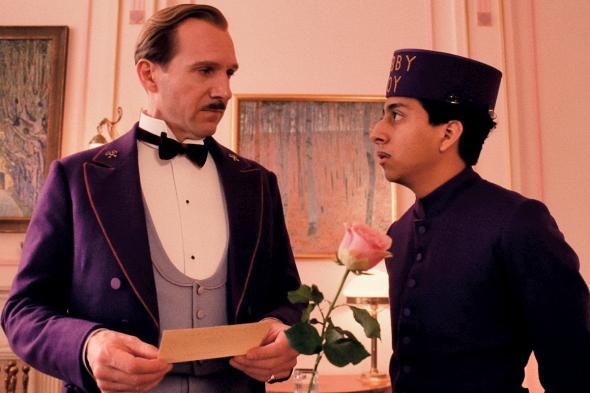Among the happy surprises of this year’s unusually wide-open Oscar race: The Grand Budapest Hotel, perhaps Wes Anderson’s best movie—and the best movie I saw in 2014—supposedly has a shot at a Best Picture nomination.
Perhaps you’re not surprised. After all, the very charming film was adored by critics and has done decent box office as well—making about $60 million in the U.S. and nearly twice that overseas—but then you could say that about most Wes Anderson movies. Critics love them and audiences, represented by tickets sold, like them pretty well. But the Academy almost completely ignores them. Anderson’s eight feature films have received just four Oscar nominations total: two for Best Original Screenplay, one for Best Original Score, and one for Best Animated Feature (those latter two were both for Fantastic Mr. Fox). They have lost every one.
There’s no accounting for taste, of course, but whether or not you like Wes Anderson movies, their failure with the Academy highlights several shortcomings of the Oscars (if, that is, you see the Oscars as an attempt to honor the very best movies made in a given year). And while I hope that The Grand Budapest Hotel breaks this streak, it may do so in part by fitting the Academy’s too-narrow sense of what a Best Picture winner should be.
There are, as I see it, at least four reasons why Wes Anderson doesn’t win Oscars. None is decisive by itself, but taken together, they seem to keep him mostly out of the running year after year.
1. Wes Anderson doesn’t campaign for awards.
As David Ehrlich noted on Wednesday in Slate, “the Oscars are a sport, and—like all sports—they’re won by whoever wants it most (provided the player has deep pockets, as this league has no salary cap).” Every indication suggests that Anderson has no interest in playing the game. Early in 2013, when Moonrise Kingdom got some Academy buzz, Entertainment Weekly asked the director what his role was “in getting Moonrise back in front of people for awards season.” Anderson’s answer: “I sort of did my job back in May [2012, when that movie was released] in terms of helping to get the movie out into the world.” Presumably if Anderson wanted to lobby for a more Oscar-friendly release date—i.e., one in late fall—he could; instead, his last two movies have come out in the spring, and Anderson doesn’t generally do the promotional rounds for awards season. The EW interviewer asked Anderson point blank if he cared about awards, and Anderson self-deprecatingly replied, “I might if I won more!” He added, “I haven’t had the opportunity to get that bug.” Perhaps he’ll never catch it.
2. Wes Anderson tells original stories.
I don’t mean “original” in an evaluative sense—I’m not referring here to his originality as an artist. What I mean is that Anderson usually doesn’t adapt literary works or depict historical events. (Fantastic Mr. Fox, his most Oscar-nominated movie, is an exception here.) Meanwhile, since 1996, the year Anderson released his first feature film, the vast majority of Best Picture winners have been either adaptations of books or based on true stories (and occasionally both). Sometimes the fact that a movie was adapted plays little role in its awards buzz (Slumdog Millionaire comes to mind). More often, though, a Best Picture winner’s seriousness is signaled in part by its weighty source material, whether literary or historical. This is one way in which Grand Budapest Hotel departs, somewhat, from Anderson’s past films: It does, in its own Andersonian way, depict history, sort of. That probably helps its chances.
3. Wes Anderson movies are funny.
In their nearly 90-year history, the Oscars have awarded only a handful of comedies Best Picture. Anderson’s movies are not flat-out comedies—and one could argue that, among recent winners, The Artist, Slumdog Millionaire, and maybe even The King’s Speech all go for laughs almost as often as Anderson typically does. Still, Anderson’s light, winking touch surely hurts his cause come awards time.
4. Wes Anderson movies look like Wes Anderson movies.
Last year’s winner, 12 Years a Slave, was unusual among Best Picture champs for its flagrantly artful—or artsy, if you’re less charitable than I—visual style. (It overcame that potential obstacle in part, of course, because it was an undeniably serious film based on the gravest historical events—and adapted from a very worthy book to boot.) Here we get into more subjective territory, but by and large directors with particularly distinctive approaches to the way their movies look seem to do better with critics than with the Academy. Quentin Tarantino, Paul Thomas Anderson, Terrence Malick, David Fincher: These filmmakers may get a movie nominated for Best Picture from time to time, but they tend not to win (those four, at least, never have). It took decades before Martin Scorsese won Best Picture—and it was for an arguably less distinctive movie than he usually makes, The Departed.
There are other factors one might list here as well—the mood of Anderson’s movies, for instance (sweetly melancholic, hardly the Academy’s wheelhouse), or their lack of big messages (voting for a Wes Anderson movie doesn’t mean anything … except that you really liked that particular Wes Anderson movie). But precedent is powerful, too: If Grand Budapest Hotel breaks through, maybe Oscar voters will think more readily of Anderson in the future.
Read the rest of Slate’s very comprehensive Wes Anderson coverage.
